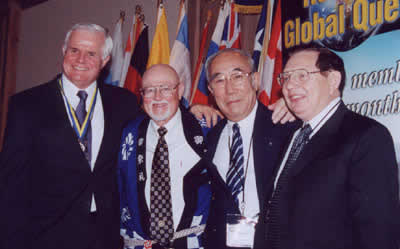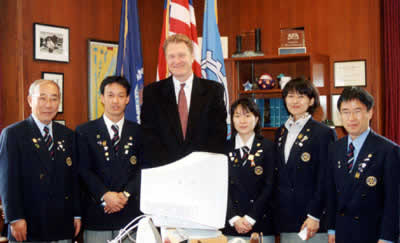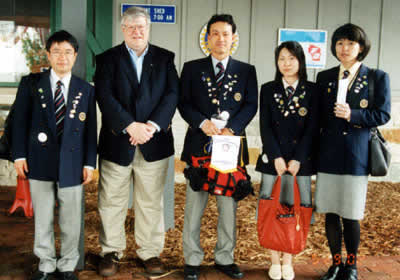
Team Leader, Member of Osaka-Otemae R.C.
Director, The Center of Propellant Research for Lifelong Learning
Introduction
I served as the team leader for our GSE trip to Milwaukee, Wisconsin in the
United States of America, where we were very warmly and hospitably received.
During my one month there, I kept a daily, detailed diary. That diary consists
of about 100,000 characters. I gave a copy of this diary to the Governor of
D-2660, those associated with the Rotary and those who know me well. Now, I
have just a few copies left.
I do not intend to reproduce that vast volume here on these pages. Instead,
in this report, I would like to share some of the thoughts I had during my time
in Wisconsin.
The D-6270 District Conference was held over a three-day period near Lake Geneva
at the Hotel Grand Geneva.

With R.I. D-6270 Governor, Jack Berry (second from the left)
Before the morning, afternoon and evening sessions of the district conference,
the participants ate breakfast, lunch and dinner together in groups of three
to five people. When the meal was finished, the opening of the session was announced.
The sessions started with the singing of the national anthem as we looked at
the flag, and immediately after that, there was a group prayer. What impressed
me deeply was the attitude everyone had toward the flag and the singing of the
national anthem. I saw a reverent loyalty manifested there. I was also impressed
by the prayer time, because the prayer was so heartfelt. It was the same at
all ten of the Rotary Clubs we visited.
In Japan, Rotary meetings are ceremonial. In some ways, the meetings and district
conferences are run in very orderly manner, but there is no custom of offering
reverent prayer to God. It really made me think.
I felt the strength of America and the fact that the Rotaryユs service and volunteer
work so naturally melds with American society. I realized that it is in these
things that the Rotaryユs ideology and fundamental attitude lie.
Next, I would like to describe the district conference. The conference was
bright and friendly, and not at all formal (what I mean here by formal is surface
formality that has no real substance to it). More than being ceremonial, it
felt like the people understood each other and were of one accord, and they
were preparing themselves to mobilize and move ahead into the next step of whatever
it was they were planning to do.
The basics were very clear. The ideology was clearly articulated. Everything
was carried out as it should have been and was quite practical. Each person
had a conscious goal, the administration was good and so was the content.
There were no arrogant people or anyone bringing up old-fashioned ideas to
be seen anywhere. Everyone cooperated with one another while allowing their
intrinsic personality and individual character to show.
The Rotary is a volunteer service organization, an organization that communicates
carefully and cooperates with others. I learned from experience that it is a
group of people who understand how to live life.
As I wrote earlier regarding what the district conference was like, regular
Rotary meetings also begin with a meal, and those meals were always buffet style.
There were no waiters or waitresses waiting on us. As soon as the meal is finished
and the meeting opens, everyoneユs attitude changes instantly and they become
formal. There were some clubs that rang a bell at the start of the meeting,
but I donユt remember there being a lot of those that did so.
People did not interfere with one another any more than was necessary, but
were kind and considerate without being pushy. Everyone was modest and humble.
This might have had something to do with the fact that many of them are descended
from European immigrants. Anyway, the people were quite modest, and they devote
themselves to treating people with hospitality from the bottom of their hearts.
Primarily, the Japanese are kind people. We can understand this by reading
the writings of foreigners who visited Japan at the end of the Edo period and
beginning of the Meiji period. They wrote of the considerateness and kindness
shown to travelers,
Even today, it might be said that the Japanese are still the same. But, I think
we Japanese have much to learn from the Europeans and Chinese in regard to their
attitude towards international understanding and international relations. I
say this because there are situations in which I see that Japanese do not have
much of a sense of communication and there has been a decline in the internationalism
of the Japanese.
I was made aware of the fact that, as far as the Rotary is concerned, this
is something that is not allowed in the least.
I saw something else that made me think at the district conference, and that
was how they nurture the next generation of Rotarians. It was the second day
of the conference at the evening meeting. Some of the young people who were
participating in the Rotaryユs international exchange student program took part
in the meeting by providing some entertainment. This surely was a beneficial
and profitable interaction.
And that wasnユt all. On the morning of the third day, before people were dismissed
and went home, it was the young people who took the initiative in all the programs.
From the commencement of the final session, the prayer music and choral piece,
to the District governorユs speech and the speech of R.I. Presidentユs Representative,
all of the closing ceremony was carried out by local high school students and
the children of Rotary members. I understood very well how they were going about
raising up the next generation of Rotarians. Whenever we had welcome parties
or farewell parties, they were very modest. The clubs didnユt rent a room at
a large hotel, but, as much as possible, they held warmer, more personal and
friendly parties. In Oshkosh, the reception party was held in one of the larger
rooms of a certain club. Each of the GSE team members received a memento, and
it was announced by the mayor of Oshkosh (a Rotarian) that May 17 would be "International
Cultural Exchange Day Between Osaka and Oshkosh."
Our farewell party was held at one of our host familyユs homes, which had a
five-acre yard. The American GSE team members and host families held this party
for us, which was a picnic and barbecue party. It was a very casual affair.
What surprised me very much was that no matter what host club or other club
we visited, the local judges, mayors and city council members were Rotarians.
I think that in America, the Rotary is one or two steps ahead of Japan when
it comes to working to improve the lifestyle of citizens in the region. The
Rotary is not just a service organization, and it is not just an administrative
organization. It is a cooperative system in which government officials, experts,
scholars, and people of goodwill work to create an effective organization that
serves the community. This may be related to the fact that America is a nation
built on the strength of its citizens, who have come from many different countries
and cultures.
Or, it may be that here in Japan, there is still some pride, some elitism associated
with being a Rotarian. I think there is a need for the Rotary in Japan to get
more government officials and people in legal circles (not just lawyers) to
become involved with the Rotary.

Our GSE team with the mayor of Milwaukee
In this regard, I'd better think the fact that there are Osaka Prefectural
government people and Osaka City government people taking part in the GSE programs
is a stepping stone to the future, but at this point in time, I donユt get the
feeling that the fruitfulness of the GSE program will be fully utilized by our
local government people. In Japan, I think we still lack the generosity and
tolerance needed for this.
Next, I would like to mention the clothing worn at the district conference
and regular Rotary meetings. The clothing seemed メalive.モ The Rotary dress code
is something that should be freer (less formal) in Japan, where the only time
Rotarians wear more casual clothing is in the hot, humid days of summer. Formal
wear, while giving a nice, clean appearance, makes some people feel tense or
nervous, I think, and this is not conducive to relating on a heart-to-heart
level with people or to thinking about and making progress toward achieving
common volunteer activity goals. In America, they wore everyday clothes and
casual clothes to their meetings, and it had an impact on the atmosphere of
the meetings.
I think the same can be said of the Rotary badges. Some clubs had lapel pins
that had a diameter of one cm or more, but others didnユt have any lapel pins
at all. Whether they wore Rotary lapel pins or not, everyone had a clear awareness
of the fact that they were Rotarians.
Now, I would like to comment on Rotary donations. In one region, there were
three Rotary clubs working together, with the support of their citizens, to
construct and operate a facility to teach the arts. Of course, it is a public
building. There, they teach things that are not normally taught in schools.
It is open to the public, and people can hold music recitals, ballet performances,
and other things there.
The construction and operating costs are being paid for by donations from the
three Rotary clubs and from the local citizens.
Some Rotary clubs are actively involved in school education and are working
to help develop educational programs by collecting donations. For example, collecting
money so that a fund will be started to pay for additional laboratory for a
school to help promote science education, or to help pay for the purchase of
equipment, etc. In addition, some clubs collect money to help build playgrounds
(or purchase playground equipment) for nursery schools and kindergartens.
I saw a number of parks while in Wisconsin. Rotary parks. They served as places
of amusement for children and places where the local citizens could go to relax.
I felt they were very friendly and peaceful places. All the donations received
by the Rotarians went to fund public institutions or public places.
Our Osaka Otemae Rotary Club has had an ongoing donation collection program
for the Osaka Prefectural School and Hospital for Physically Disabled Children,
but the collection method is different. If a public institution or facility
were to receive donations from the Rotary or citizens and then try to use that
money effectively, there would possibly be a need to change the Japanese tax
system if the money were to be used as it is in America. While in Wisconsin,
we visited some schools and a nursery school and another school that use both
Spanish and English in their lessons. The American Rotary clubs are practicing
a serious donation effort for such schools and public parks, etc. In this way,
they are becoming a part of the daily lives of American citizens, and I felt
keenly that their Rotary clubs are a vital, living part of the citizens' lives.
I thought that the "support but no control" spirit was alive and
well in America. In America, people are familiar with and are supportive of
the Rotary and its activities.
All of my host families were very kind and caring. They all thought about how
they could make the time enjoyable for their guest and how they could help us
experience a relaxing and moving time before we left for Japan. I am not a heavy
smoker, but my host families provided a place for me to smoke while I was there.
However, I also noticed that there were times when the team members relied
too much on the kindness of the host families, which was unfortunate. We had
made our hopes and wishes known in advance to our GSE committee chairman and
then put it all in writing, translated it into English and sent it to Wisconsin
to the D-6270 GSE chairman. Each of the host clubs took our requests into account
and made plans and arrangements for us. However, at times, I felt that we requested
more of the host clubs than they had actually planned to do for us. I think
this is something we need to reflect upon.
I heard this from GSE Chairman Nomura, after we returned to Japan, that D-6270
GSE team leader Erik Moeser said, "The team leader who came to America
showed that he was a Japanese." After hearing that evaluation, I was pleased
and satisfied.
The key to international understanding is being able to explain 120% about
oneユs native country, and one needs to be able to prove these explanations by
his/her words and actions, I think. I say this because I have had the bitter
experience of not knowing enough about Japan, and consequently not being able
to truly understand another country.
Because I thought this way, I took along Japanese clothing (which I wore in
America from time to time), and Because I thought this way, I took along Japanese
clothing (which I wore in America from time to time), and used Japanese at the
start of our presentations in explaining about Osaka Cityユs history and culture.
Of course, while I was in Japan, I translated my speech into English, and with
the help of an American who is living in Japan, polished it up before leaving
for the USA. At the district conference, I handed a copy of the English to D-6270
GSE team leader Erik Moeser. Then I read it to him in Japanese one phrase at
a time while he read along in English.
When we were asked to visit other Rotary clubs to give our presentations, I
did the same thing. The D-6270 GSE chairman, Patrick Lyddane, complimented me
deeply for doing this.

With R.I. D-6270 GSE Chairman Pat Lyddane
I also took some colored paper along with me and wrote some of the tanka poetry,
etc. that I had composed myself on it to give to my host families. At club meetings
and other gatherings, I performed Japanese songs (sailing songs and other old
songs). Of course, I also talked about Japanese and Asian history, culture,
art, lifestyle and religion. I didnユt stop there, though. I also had the opportunity
to talk with people about overseas travel, European music and art, etc. about
which we have common understanding.
In this way, I was able to show and explain about Japanese values and about
the Japanese character and cultural background. But, Japanese must not forget
internationally accepted manners, such as greetings and dinner manners.
Moreover, it is vital that we cook typical Japanese meals for our host families
and prepare a real feast for them. Granted, it may be impossible to find all
the necessary ingredients overseas, but I think we should strive to show our
eagerness to make something for them. I donユt think there is anyone who will
get angry eating a delicious meal.
Most of my trips are taken alone. This time, I traveled with four men and women
who had the same purpose in going overseas, and I did my utmost to back them
up by giving them detailed instructions and warning them to do as I said from
time to time. But, I wanted to be like the proverbial monkeys and メsee no evil,
hear no evil and speak no evilモ during our time in the States, and kind of let
them all do as they wished. Well, anyway, I was able to do it without much stress.
In Japan, I am always so busy with many different things. On this GSE trip,
I was able to sit down and enjoy reading the English newspaper without having
to make phone calls and without spending time watching the news, movies and
TV dramas. Instead, I had time to look inward and meditate and contemplate,
for which I am very thankful.
I would like to end my report by saying that I am very grateful for having
the opportunity to serve as GSE team leader for D-2660 from 2001 through 2002.
Yoshikazu Satoh
June, 2002